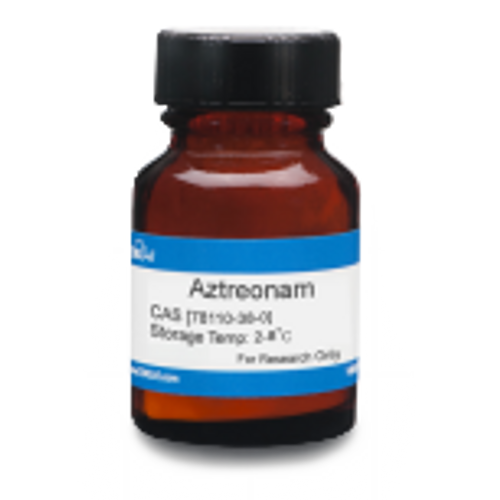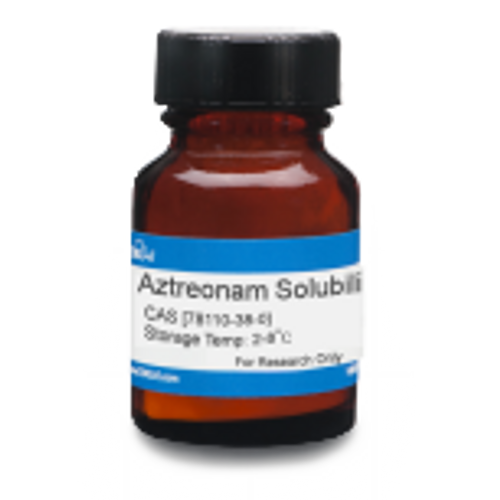Aztreonam is a synthetic β-lactam antibiotic originally isolated from Chromobacterium violaceum. As a monobactam, it contains a single β-lactam ring instead of the fused β-lactam and thiazolidine rings found in generic β-lactams. Due to its unique structure, Aztreonam is not typically inactivated by β-lactamases. Aztreonam is used in microbiology, cancer research, and plant tissue culture applications.
Aztreonam is soluble in ethanol, DMSO and DMF but is practically insoluble in water.
We also offer:
- Aztreonam, Solubilized (A038)
| Mechanism of Action | β-lactams interfere with PBP (penicillin binding protein) activity involved in the final phase of peptidoglycan synthesis. PBP’s are enzymes which catalyze a pentaglycine crosslink between alanine and lysine residues providing additional strength to the cell wall. Without a pentaglycine crosslink, the integrity of the cell wall is severely compromised and ultimately leads to cell lysis and death. Resistance to β-lactams is commonly due to cells containing plasmid encoded β-lactamases. |
| Spectrum | Aztreonam is effective against Gram-negative bacteria. |
| Microbiology Applications | Aztreonam is commonly used in clinical in vitro microbiological antimicrobial susceptibility tests (panels, discs, and MIC strips) against negative microbial isolates. Aztreonam has also shown high potency against high-resistant superbug strains. Medical microbiologists use AST results to recommend antibiotic treatment. Representative MIC values include:
|
| Plant Biology Applications | Aztreonam is a broad-spectrum antibiotic commonly used in plant tissue culture to control bacterial contamination from Gram-negative species. |
| Cancer Applications | Aztreonam is effective against infections caused by Gram-negative bacteria but must be used in combination to provide Gram-positive coverage. |
| Molecular Formula | C13H17N5O8S2 |
| Solubility | Soluble in ethanol (20 mg/ml), DMSO (20 mg/ml) and DMF (30 mg/ml). Practially insoluble in water. |
| References |
Jones PG et al (1986) Aztreonam therapy in neutropenic patients with cancer. Am. J. Med. 81(2):243-248. PMID 3526885 Moreau-Marquis S, Coutemarsh B, Stanton BA (2015) Combination of hypothiocyanite and lactoferrin (ALX-109) enhances the ability of tobramycin and aztreonam to eliminate biofilms growing on cystic fibrosis airway epithelial cells. J. Antimicrob. Chemother 70(1):160-166. PMID 25213272 Pitout JD, Sanders CC, Sanders WE (1997) Antimicrobial resistance with focus on beta-lactam resistance in Gram-negative bacilli. Am. J. Med. 1997; 103(1):51-59 PMID 9236486 |
| MIC | Bacteroides fragilis| 2 - 128|| Borrelia burgdorferi S.L.| 2 - >64|| Burkholderia cepacia| 4 - >512|| Citrobacter amalonaticus| ≤0.12 - >64|| Citrobacter braakii| ≤0.12 - >64|| Citrobacter diversus| 0.03 - >128|| Citrobacter farmeri| ≤0.12 - >64|| Citrobacter freundii| 0.015 - >128|| Citrobacter koseri| ≤0.12 - >16|| Citrobacter spp.| ≤0.12 - >64|| Citrobacter werkmanii | >64|| Enterobacter aerogenes| ≤0.12 - >128|| Enterobacter agglomerans| 0.125 - >128|| Enterobacter amnigenus| ≤0.12 - >64|| Enterobacter asburiae| ≤0.12 - >64|| Enterobacter cancerogenus| ≤0.12 - >16|| Enterobacter cloacae| 0.06 - >128|| Enterobacter gergoviae| ≤0.12 - >16|| Enterobacter hormaechei| ≤0.12 - >16|| Enterobacter intermedius| 0.12 - >64|| Enterobacter sakazakii| 0.06 - 64|| Enterobacter spp.| ≤0.12 - >16|| Enterobacter taylorae| ≤0.12 - >16|| Enterobacteriaceae| 0.004 - 256|| Enterococcus faecalis| ≥128|| Escherichia coli| 0.03 - >128|| Haemophilus spp.| 0.015 - 2|| Hafnia alvei| ≤1|| Helicobacter pylori| 4 - 8|| Klebsiella ornithinolytica| ≤0.12 - >16|| Klebsiella ozaenae| ≤0.12 - >16|| Klebsiella pneumonia| 0.008 - >256|| Klebsiella rhinoscleromatis| ≤1|| Klebsiella spp.| ≤0.12 - >16|| Klebsiella terrigena| ≤0.12 - >16|| Lactobacillus acidophilus| >100 || Lactobacillus gasseri| 100|| Lactobacillus johnsonii| >100 || Lactobacillus paracasei| 100|| Lactobacillus salivarius| >100|| Morganella morganii| 0.004 - 32|| Neisseria spp.| 0.015 - 259|| Ochrobactrum anthropi| ≥128|| Pasteurella multocida| 0.015 - 128|| Plesiomonas shigelloides| 0.015 - 128|| Proteae spp.| ≤0.12 - >16|| Proteus mirabilis| 0.015 - >16|| Proteus penneri| 0.06 - ≤1|| Proteus rettgeri| 0.004 - 1|| Proteus vulgaris| 0.004 - >64|| Providencia alcalifaciens| 0.004 - 1|| Providencia rettgeri| ≤0.125 - 1|| Providencia stuartii| 0.004 - 4|| Pseudomonas aeruginosa| ≤0.12 - 1024|| Pseudomonas maltophilia| >8 - >32|| Pseudomonas spp.| 5 - 128|| Ralstonia pickettii| 128|| Salmonella| ≤0.12 - >16|| Salmonella agona| ≤0.12 - >16|| Salmonella arizonae| ≤0.12 - >16|| Salmonella bareilly| ≤0.12 - >16|| Salmonella enterica| ≤0.12 - >16|| Salmonella enteritidis| 0.03 - >16|| Salmonella hadar| ≤0.12 - >16|| Salmonella heidelberg| ≤0.12 - >16|| Salmonella infantis| ≤0.12 - >16|| Salmonella litchfield| ≤0.12 - >16|| Salmonella Montevideo| ≤0.12 - >16|| Salmonella muenchen| ≤0.12 - >16|| Salmonella Newport| ≤0.12 - >16|| Salmonella panama| ≤0.12 - >16|| Salmonella Paratyphi| ≤0.12 - >16|| Salmonella schwarzengrund| ≤0.12 - >16|| Salmonella spp.| ≤0.12 - >16|| Salmonella stanley| ≤0.12 - >16|| Salmonella stpaul| ≤0.12 - >16|| Salmonella thompson| ≤0.12 - >16|| Salmonella typhi| 0.03 - >16|| Salmonella typhimurium| ≤0.12 - >16|| Salmonella virchow| ≤0.12 - >16|| Serratia fonticola| ≤0.12 - 32|| Serratia liquefaciens| ≤0.12 - >16|| Serratia marcescens| 0.06 - >64|| Serratia odorifera| ≤0.12 - >16|| Serratia plymuthica| ≤0.12 - >16|| Serratia rubidaea| ≤0.12 - >16|| Serratia spp.| ≤0.12 - >16|| Shigella boydii| ≤0.12 - 0.25|| Shigella dysenteriae| ≤0.12 - 0.25|| Shigella flexneri| 0.03 - 1|| Shigella sonnei| 0.03 - 1|| Shigella spp.| ≤0.12 - 0.25|| Shingella dysenteriae| 0.03 - 1|| Staphylococci| 32 - >128|| Staphylococcus aureus| 8 - >128|| Staphylococcus epidermidis| 8 - 32|| Staphylococcus haemolyticus| >32|| Staphylococcus saprophyticus| 32|| Stenotrophomonas maltophilia| >32 - 1024|| Streptococci spp.| 0.5 - 2|| Streptococcus agalactiae| ≥128|| Streptococcus pyogenes| 8 - ≥128|| Xanthomonas maltophilia| >128|| Yersinia enterocolitica| 0.015 - 128|| |




